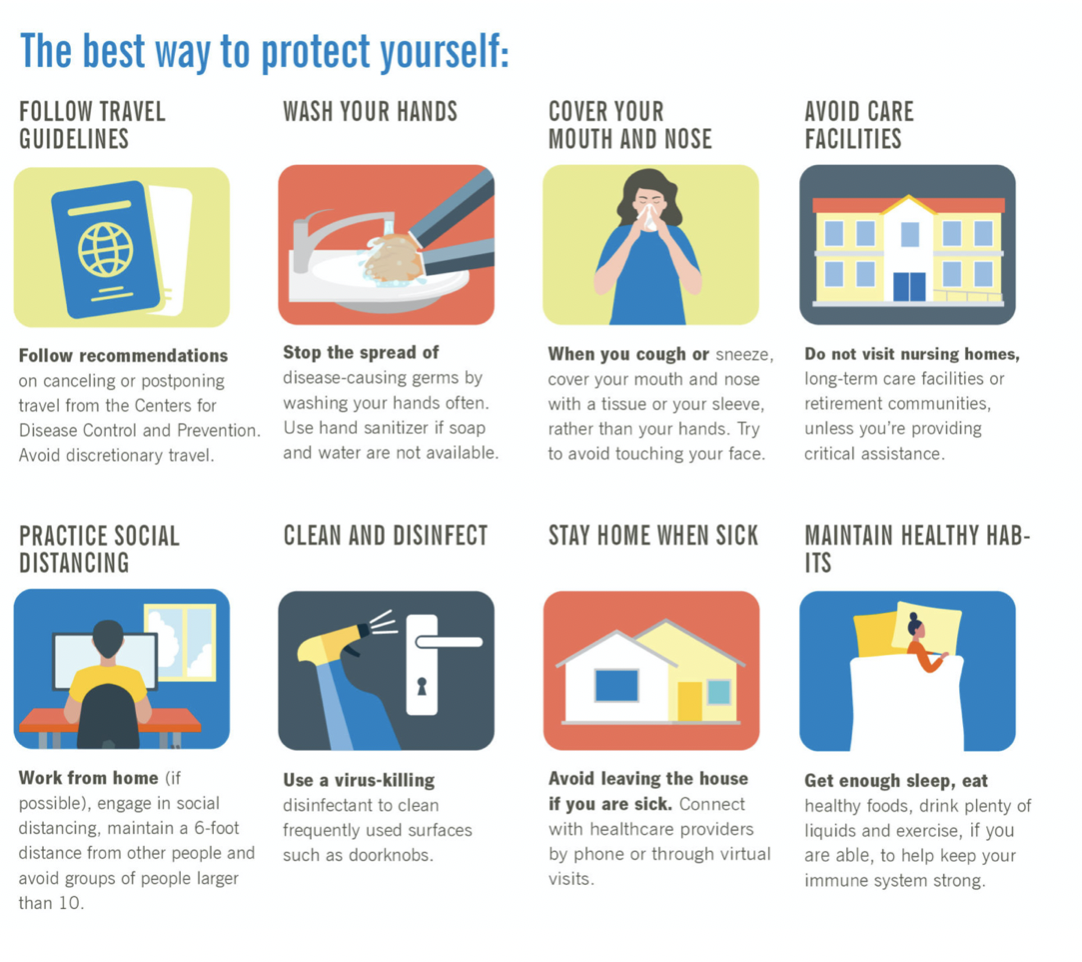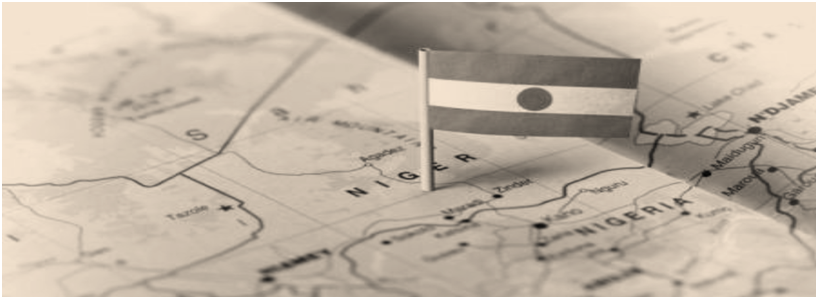
Weekly Highlights
- Eid El-Fitr celebrated under the sign of the fight against COVID-19
- Niger says West Africa is making progress in fight against extremists
- Diffa region – 12 soldiers killed in Boko Haram attack – 18 May 2020
- Self-help project in Niger churns out hygiene products in fight against coronavirus
- Niger exchange rate – Exchange rates West African CFA franc – USD = 602.293 XOF XOF= 0.00166032 USD
EXECUTIVE SUMMARY
Eid El-Fitr celebrated under the sign of the fight against COVID-19
The Muslim community of Niger celebrated this Saturday, May 23, 2020, Eid El-Fitr which marks the end of the blessed month of Ramadan, a month of abstinence, devotion and worship to Allah. This year, Eid El-Fitr intervenes in a context marked by the Coronavirus or Covid-19 pandemic which is raging in the world. It was therefore celebrated under the sign of preventive measures taken by the Government including, among other things, hand washing with soap or with hydro-alcoholic gel, wearing a bib, or even the social distancing of one (1) meter. In Niamey, the President of the Republic Issoufou Mahamadou took part in the collective prayer at the Great Prayer Mosque, in the presence of the President of the National Assembly Ousseini Tinni, Prime Minister Brigi Rafini, the High Representative of the President of the Republic, presidents of the Institutions of the Republic, deputies, Members of the Government, those of the Diplomatic Corps of Muslim countries, as well as several faithful.
Niger says West Africa is making progress in fight against extremists
West African states are making progress in their fight against Islamist militants even as they grapple with the coronavirus pandemic, Niger President Mahamadou Issoufou said. Affected states are working closely with international partners to keep up the fight against jihadists who have gained influence in recent years, with attacks spanning at least seven countries, Issoufou told a panel of African leaders at a New York Forum Institute webcast on Tuesday. “The crisis hasn’t had an impact on military operations,” said Issoufou, who’s also chairman of the Economic Community of West African States. “Our armies and security forces are increasingly gaining ground on the terrorists,” even though threatened states now face the triple threat of “security, health and economic crises,” he said.
Diffa region – 12 soldiers killed in Boko Haram attack – 18 May 2020
Twelve soldiers have been killed in a Boko Haram attack on a military outpost in Niger’s Diffa region, scene of recent clashes with jihadist fighters, the defence ministry said Tuesday. The attack by “Boko Haram terrorists” overnight Monday on the Blabrine military base left another 10 soldiers wounded, the ministry said in a statement. “Seven terrorists were neutralized” by Niger soldiers, the ministry said in the statement read out on public radio late Tuesday. The Blabrine base is some 20 kilometres (12 miles) northeast of Diffa town in the remote south-eastern region near Lake Chad, where the borders of Cameroon, Chad, Niger and Nigeria converge. Diffa, a city of 200,000 near the Nigerian border, has been repeatedly attacked. The region of the poor Sahel country borders Nigeria, the birthplace of Boko Haram.
Self-help project in Niger churns out hygiene products in fight against coronavirus
It started as a mini-cooperative to give a small income for hundreds of refugees evacuated from Libya. But with the onset of the coronavirus pandemic, this small self-help project has grown into a “factory” and churns out bars of soap, liquid handwash, bleach and water containers for free distribution. The project was established in 2019 by UNHCR, the UN Refugee Agency and Forge Arts, a local non-profit, at an emergency transit mechanism (ETM) centre in Hamdallaye, a small town less than 100 kilometres from Niamey, Niger’s capital. Here, over 280 refugee women work, doing their part to respond to the increasing demand for hygiene products. “We are not only helping to fight this disease but are also learning new skills that will help us when we return home,” says Nicole, who was evacuated from Libya and currently lives in the centre, where she’s learnt how to make bleach without using any machinery.
USEFUL INFORMATION
List of holidays in Niger 2020
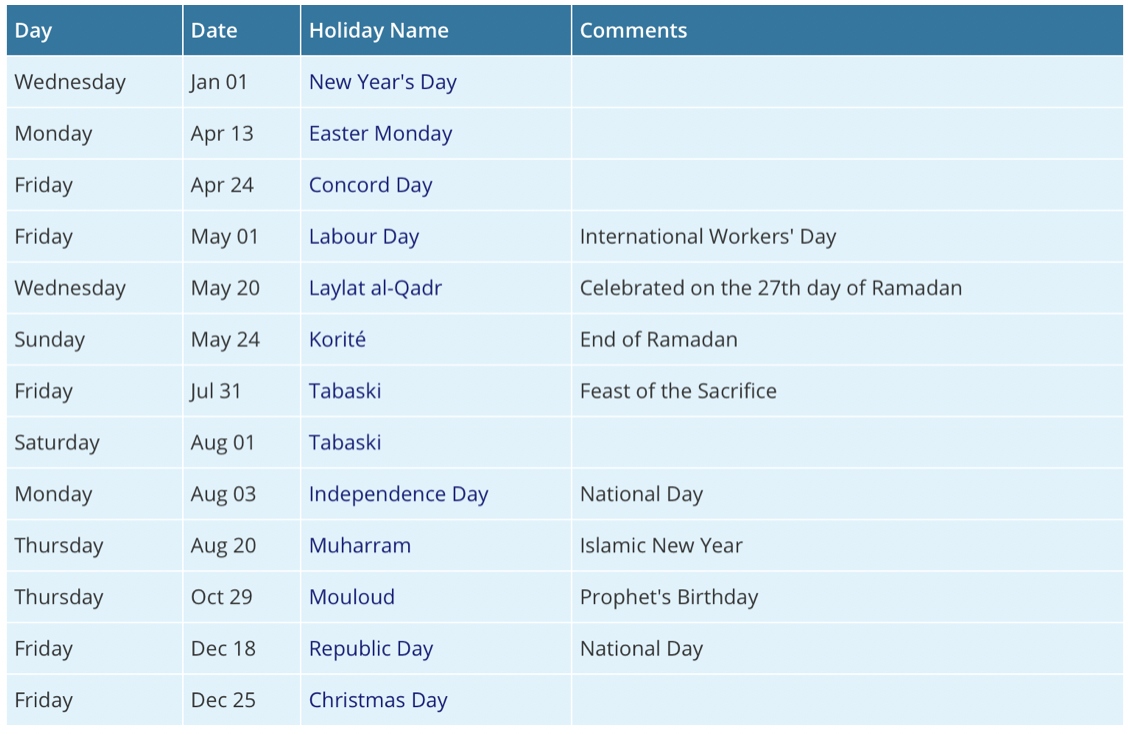
Exchange rates West African CFA franc
According to our most recent information (25th May 2020) the West African CFA franc has the following exchange rates.
The exchange rate from your own bank or credit card company will differ somewhat from the exchange rates as mentioned above. Your bank or credit card company might also apply additional international charges.
| USD = 602.293 XOF | XOF= 0.00166032 USD |
| EUR = 655.957 XOF | XOF= 0.00152449 EUR |
| **As at 25 May 2020 |
NIGER SECURITY & RISK LEVELS
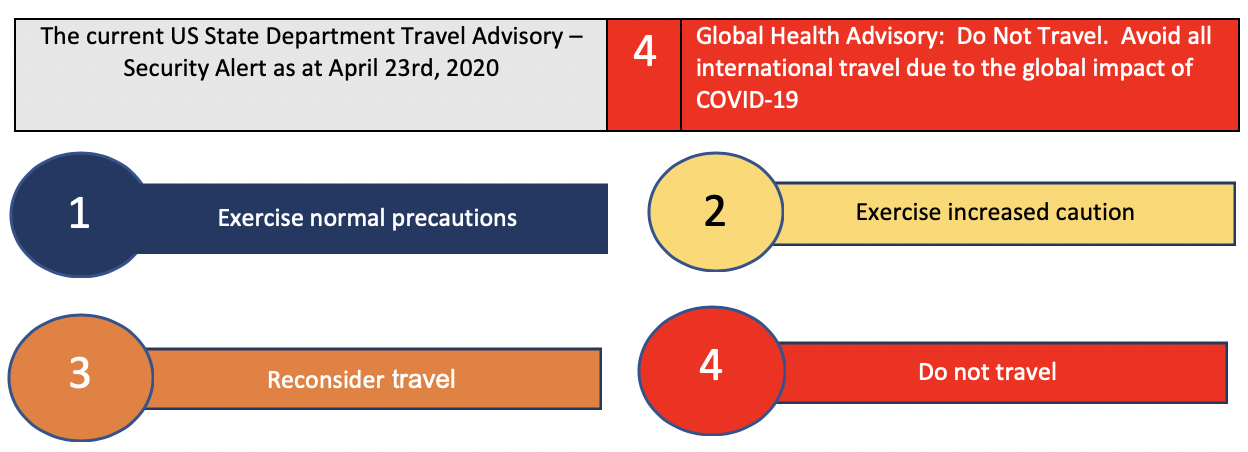
Event: The purpose of this notice is to remind everyone to increase personal awareness during Ramadan.
As with other religious events, terror groups sometimes attach symbolism to this special time and choose holidays to conduct attacks. Whenever possible, the Embassy recommends avoiding exposure to places where westerners frequently congregate such as certain restaurants and grocery stores. Be particularly vigilant around places of worship, locations where large crowds may gather, and government facilities.
Everyone should be aware that additional traffic accidents usually take place at sunset, around 1915 in the evening, as commuters rush home to break the fast.
International citizens to exercise caution as demonstrations can occur suddenly anywhere throughout the city. If you see a crowd forming, do not attempt to drive through it. Leave the area and use an alternate route.
International citizens in Niger should:
- Abide by the curfew and stay indoors between 9 p.m. and 5 a.m., if in Niamey.
- Avoid any areas with demonstrations.
- Review your personal security plans.
- Be aware of your surroundings.
- Monitor local media for updates.
Global Health Advisory
The Department of State advises U.S. citizens to avoid all international travel due to the global impact of COVID-19. In countries where commercial departure options remain available, U.S. citizens who live in the United States should arrange for immediate return to the United States, unless they are prepared to remain abroad for an indefinite period.
At present the Department of State is making every effort to assist U.S. citizens overseas who wish to return to the United States. As the Covid-19 situation develops, our ability to provide such assistance working with commercial airlines or arranging for evacuation flights may become more limited or even unavailable. In recent weeks, commercial airlines have significantly reduced flight schedules and countries have closed airports and borders with little advance notice. If you wish to return to the United States, you should make arrangements to do so now and contact the nearest U.S. Embassy or Consulate for assistance as needed. There is no guarantee that the Department of State will be able to continue to provide repatriation assistance and transportation options to the United States may be unavailable in the future. If you choose to remain overseas, you should be prepared to remain where you are for the foreseeable future.
U.S. citizens who live abroad should avoid all international travel. Many countries are experiencing COVID-19 outbreaks and implementing travel restrictions and mandatory quarantines, closing borders, and prohibiting non-citizens from entry with little advance notice. Airlines have cancelled many international flights and several cruise operators have suspended operations or cancelled trips. If you choose to travel internationally, your travel plans may be severely disrupted, and you may be forced to remain outside of the United States for an indefinite timeframe. For further information: COVID-19 Traveler Information
On March 14, the Department of State authorized the departure of U.S. personnel and family members from any diplomatic or consular post in the world who have determined they are at higher risk of a poor outcome if exposed to COVID-19 or who have requested departure based on a commensurate justification. These departures may limit the ability of U.S. Embassies and consulates to provide services to U.S. citizens.
If you decide to travel abroad or are already outside the United States:
- Consider returning to your country of residence immediately using whatever commercial means are available.
- Have a travel plan that does not rely on the U.S. Government for assistance.
- Review and follow the CDC’s guidelines for the prevention of coronavirus.
- Check with your airline, cruise lines, or travel operators regarding any updated information about your travel plans and/or restrictions.

NIGER INCIDENT MAPPING
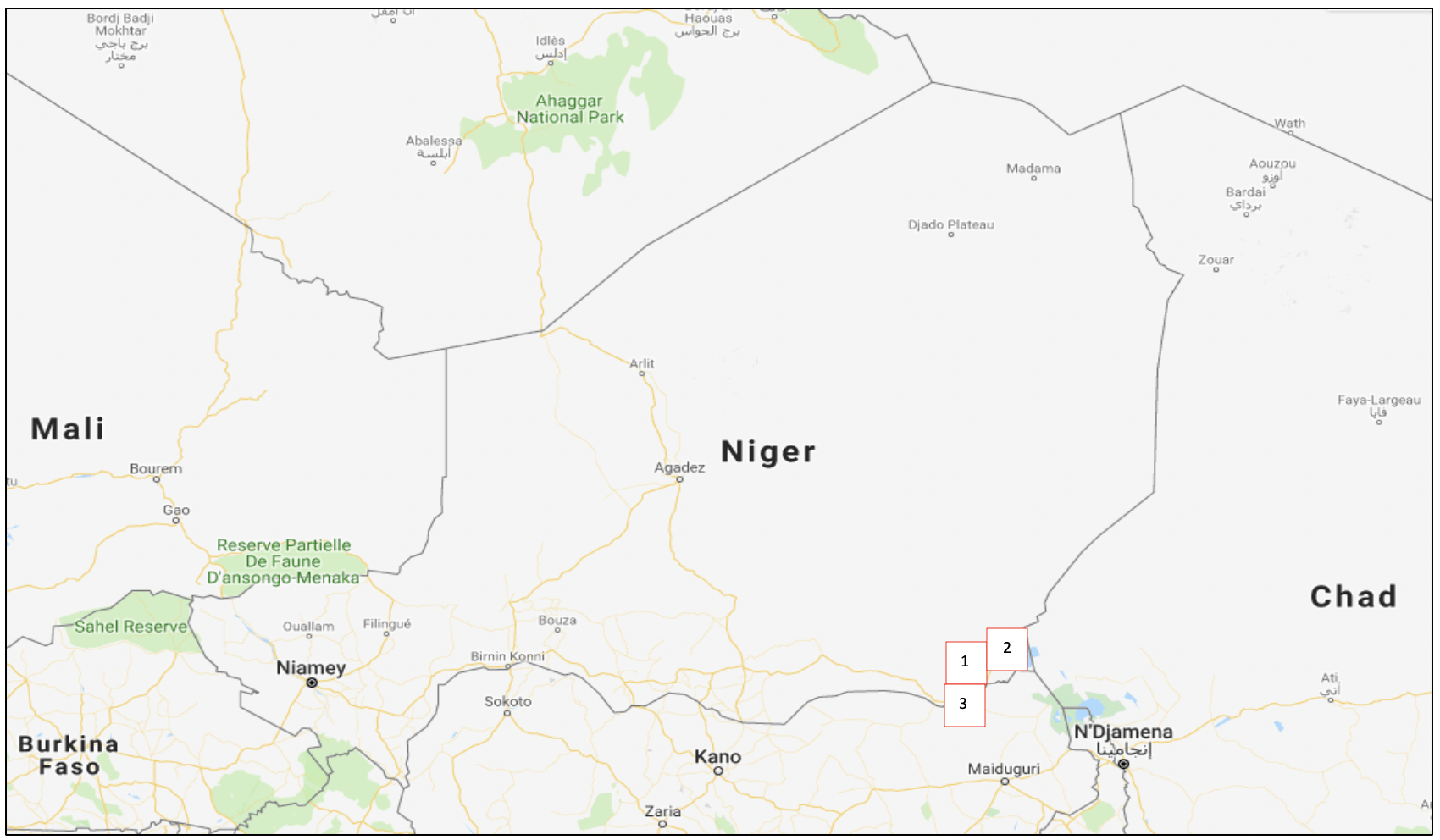
NIGER INCIDENTS IN DETAIL
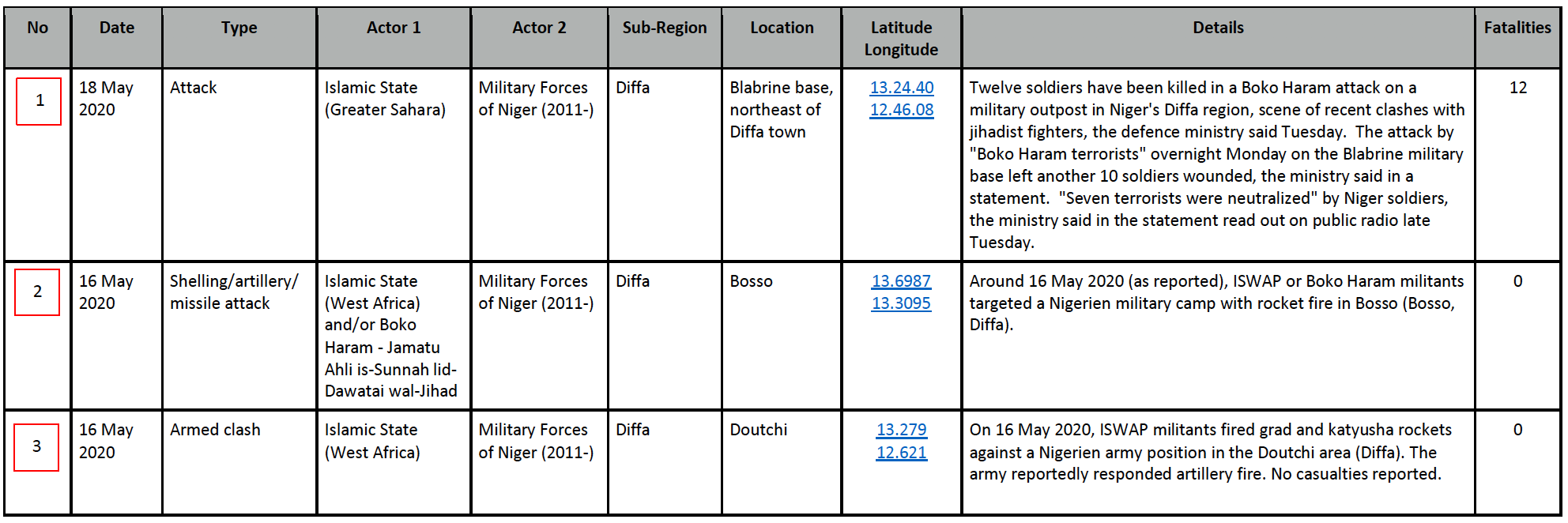
Niger: 12 soldiers killed in Boko Haram attack on military base
Twelve soldiers have been killed in a Boko Haram attack on a military outpost in Niger’s Diffa region, the scene of recent clashes with armed fighters. The attack by “Boko Haram terrorists” overnight on Monday on the Blabrine military base left another 10 soldiers wounded, Niger’s defence ministry said in a statement late on Tuesday. “Seven terrorists were neutralized” by Niger soldiers, the statement added. The Blabrine base is some 20km (12 miles) northeast of Diffa town in the remote south-eastern region near Lake Chad, where the borders of Cameroon, Chad, Niger and Nigeria converge.
Diffa, a city of 200,000 near the Nigerian border, has been repeatedly attacked. The region of the poor Sahel country borders Nigeria, the birthplace of Boko Haram. It shelters some 300,000 refugees from Nigeria as well as internally displaced people, according to United Nations figures.
In October 2019, 12 Niger troops were killed at Blabrine, according to the defence ministry. Several violent clashes have pitted the army against armed fighters in the region since the start of May. On May 13, Niger said 75 Boko Haram combatants were killed in the southeast of the country and across the border in Nigeria. Fighters carried out another attack in the same area on Saturday. Boko Haram has been active in the impoverished northeast of Nigeria border areas since 2009. Attacks by the group have claimed more than 36,000 lives since and displaced nearly two million people.
POLITICAL OVERVIEW
In Niger, the United States, through the Department of State, U.S. Agency for International Development, and the Department of Defence, are providing nearly $4 million to help respond to the COVID-19 outbreak. This assistance will support risk communication, infection prevention and control, and coordination. The United States government anticipates additional contributions in the coming weeks. Over the past 20 years, the United States has invested $2 billion in total assistance in Niger, including $233 million in health assistance. There is profound wisdom in the African proverb that says, “If you want to go quickly, go alone. If you want to go far, go together.” Our American communities face the same suffering and the same challenges as yours. We will overcome this crisis by reaffirming that which makes us human and free: honest and transparent communication, creative collaboration, and genuine accountability to our loved ones and communities.
The Turkish Minister for Foreign Affairs, Mevlüt Çavuşoğlu declared, this Sunday, May 24, 2020, on the eve of the “Africa Day” to be celebrated on Monday, May 25, that his country (Turkey) wishes to strengthen further its “relations with Africa on the basis of a” win-win “vision and mutual respect ”. In his message, of which the ANP received a copy, the Turkish diplomat indicated that the development carried out in recent years by the African continent in various fields and the partnership between this continent and his country. After making a brief reminder of the prowess achieved in Africa by his country in the field of diplomacy, the Turkish diplomat stressed that “ Turkey’s interest in Africa, with which it has historical and human ties, and the feelings of friendship of the Turkish people towards the African Continent are not new”.
Biometric enrolment operations will resume on May 25 in communes 4 and 5, according to an announcement by the CENI. They will continue until June 7, 2020 according to the same source. Biometric enrolment operations were suspended in these two municipalities in the capital on March 30 due to the measures taken as part of the fight against the Covid-19 pandemic. With the favourable development of the situation, the government has eased several of these measures and the Independent National Electoral Commission (CENI) has rescheduled operations from May 25 to June 7, 2020. Before Niamey, the CENI had already announced the resumption of operations in the communes of the departments of Tillabéri and Tahoua where enrolment was also suspended for a few weeks due to the prevailing climate of insecurity in the area. With the resumption of operations in these remaining municipalities, the CENI begins the final stretch of this phase of enrolling citizens, an important phase in the preparation of the biometric electoral file, in preparation for the next elections.
MEDICAL REQUIREMENTS AND INFORMATION
Vaccinations required to enter the country
Proof of vaccination against yellow fever is required over one year of age entering the country. The government of Niger recommends vaccine for travelers departing Niger.
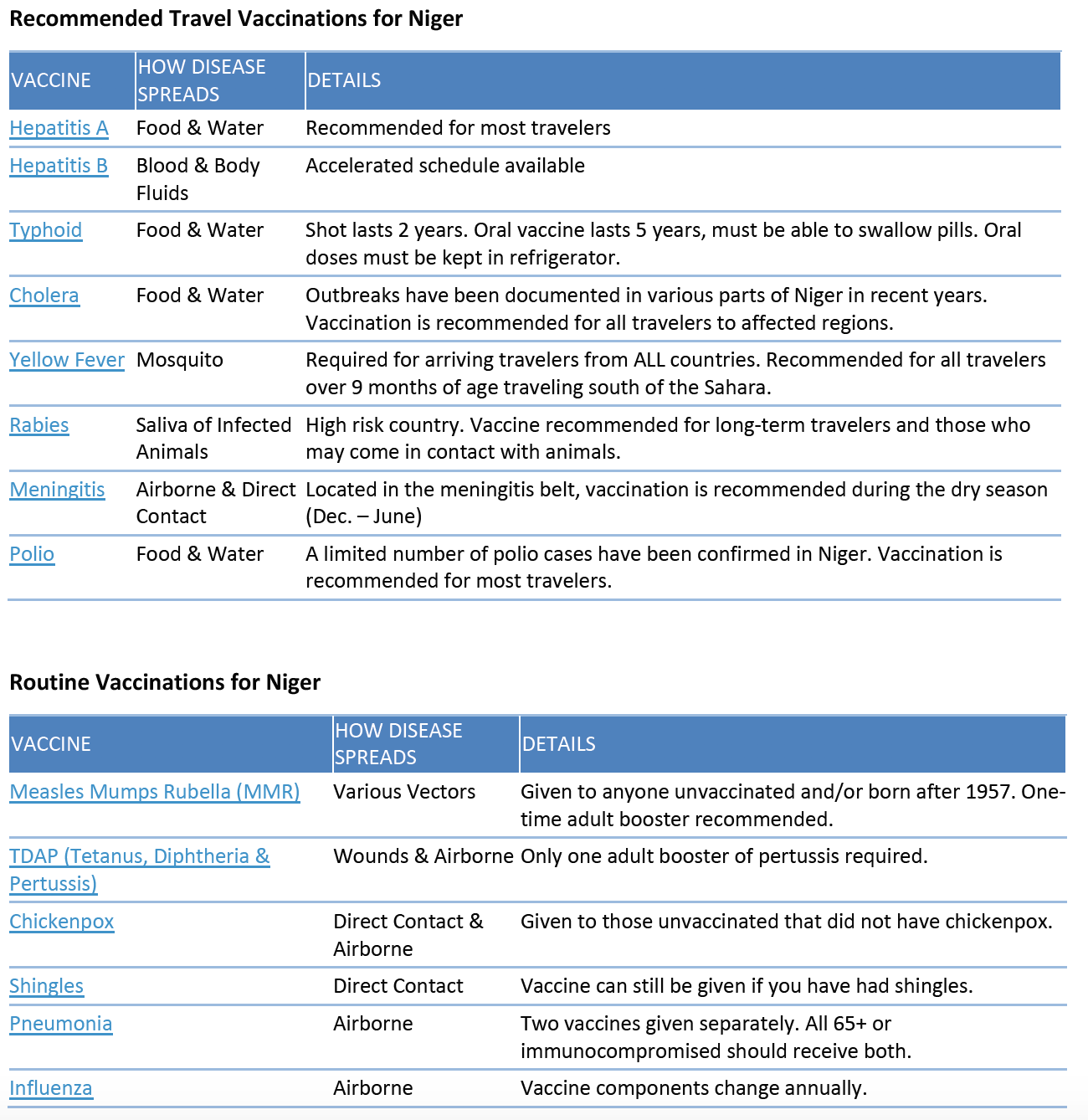
CORONAVIRUS DISEASE (COVID-19) ADVISE FOR THE PUBLIC
Protecting yourself and others from the spread COVID-19
You can reduce your chances of being infected or spreading COVID-19 by taking some simple precautions:
- Regularly and thoroughly clean your hands with an alcohol-based hand rub or wash them with soap and water. Why? Washing your hands with soap and water or using alcohol-based hand rub kills viruses that may be on your hands.
- Maintain at least 1-meter (3 feet) distance between yourself and others. Why? When someone coughs, sneezes, or speaks they spray small liquid droplets from their nose or mouth which may contain virus. If you are too close, you can breathe in the droplets, including the COVID-19 virus if the person has the disease.
- Avoid going to crowded places. Why? Where people come together in crowds, you are more likely to come into close contact with someone that has COIVD-19 and it is more difficult to maintain physical distance of 1 meter (3 feet).
- Avoid touching eyes, nose and mouth. Why? Hands touch many surfaces and can pick up viruses. Once contaminated, hands can transfer the virus to your eyes, nose or mouth. From there, the virus can enter your body and infect you.
- Make sure you, and the people around you, follow good respiratory hygiene. This means covering your mouth and nose with your bent elbow or tissue when you cough or sneeze. Then dispose of the used tissue immediately and wash your hands. Why? Droplets spread virus. By following good respiratory hygiene, you protect the people around you from viruses such as cold, flu and COVID-19.
- Stay home and self-isolate even with minor symptoms such as cough, headache, mild fever, until you recover. Have someone bring you supplies. If you need to leave your house, wear a mask to avoid infecting others. Why? Avoiding contact with others will protect them from possible COVID-19 and other viruses.
- If you have a fever, cough and difficulty breathing, seek medical attention, but call by telephone in advance if possible and follow the directions of your local health authority. Why? National and local authorities will have the most up to date information on the situation in your area. Calling in advance will allow your health care provider to quickly direct you to the right health facility. This will also protect you and help prevent spread of viruses and other infections.
- Keep up to date on the latest information from trusted sources, such as WHO or your local and national health authorities. Why? Local and national authorities are best placed to advise on what people in your area should be doing to protect themselves.
Advice on the safe use of alcohol-based hand sanitizers
To protect yourself and others against COVID-19, clean your hands frequently and thoroughly. Use alcohol-based hand sanitizer or wash your hands with soap and water. If you use an alcohol-based hand sanitizer, make sure you use and store it carefully.
- Keep alcohol-based hand sanitizers out of children’s reach. Teach them how to apply the sanitizer and monitor its use.
- Apply a coin-sized amount on your hands. There is no need to use a large amount of the product.
- Avoid touching your eyes, mouth and nose immediately after using an alcohol-based hand sanitizer, as it can cause irritation.
- Hand sanitizers recommended to protect against COVID-19 are alcohol-based and therefore can be flammable. Do not use before handling fire or cooking.
- Under no circumstance, drink or let children swallow an alcohol-based hand sanitizer. It can be poisonous.
- Remember that washing your hands with soap and water is also effective against COVID-19.
